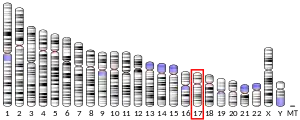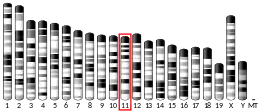ATP2A3
Sarcoplasmic/endoplasmic reticulum calcium ATPase 3 is an enzyme that in humans is encoded by the ATP2A3 gene.[5][6]
| ATP2A3 | |||||||||||||||||||||||||||||||||||||||||||||||||||
|---|---|---|---|---|---|---|---|---|---|---|---|---|---|---|---|---|---|---|---|---|---|---|---|---|---|---|---|---|---|---|---|---|---|---|---|---|---|---|---|---|---|---|---|---|---|---|---|---|---|---|---|
| Identifiers | |||||||||||||||||||||||||||||||||||||||||||||||||||
| Aliases | ATP2A3, SERCA3, ATPase sarcoplasmic/endoplasmic reticulum Ca2+ transporting 3 | ||||||||||||||||||||||||||||||||||||||||||||||||||
| External IDs | OMIM: 601929 MGI: 1194503 HomoloGene: 69131 GeneCards: ATP2A3 | ||||||||||||||||||||||||||||||||||||||||||||||||||
| |||||||||||||||||||||||||||||||||||||||||||||||||||
| |||||||||||||||||||||||||||||||||||||||||||||||||||
| |||||||||||||||||||||||||||||||||||||||||||||||||||
| |||||||||||||||||||||||||||||||||||||||||||||||||||
| |||||||||||||||||||||||||||||||||||||||||||||||||||
| Wikidata | |||||||||||||||||||||||||||||||||||||||||||||||||||
| |||||||||||||||||||||||||||||||||||||||||||||||||||
This gene encodes one of the SERCA Ca2+-ATPases, which are intracellular pumps located in the sarcoplasmic or endoplasmic reticula of cells. SERCA3 expression was originally described as non-muscular, but was recently observed in cardiomyocyte. This enzyme catalyzes the hydrolysis of ATP coupled with the translocation of calcium from the cytosol to the sarcoplasmic reticulum lumen, and is involved in calcium sequestration associated with muscular excitation and contraction. Alternative splicing results in 6 transcript variants encoding different isoforms named SERCA3a to SERCA3f.[6]
Cancer
ATP2A3 gene has been observed progressively downregulated in Human papillomavirus-positive neoplastic keratinocytes derived from uterine cervical preneoplastic lesions at different levels of malignancy.[7] For this reason, ATP2A3 is likely to be associated with tumorigenesis and may be a potential prognostic marker for uterine cervical preneoplastic lesions progression.[7]
References
- GRCh38: Ensembl release 89: ENSG00000074370 - Ensembl, May 2017
- GRCm38: Ensembl release 89: ENSMUSG00000020788 - Ensembl, May 2017
- "Human PubMed Reference:". National Center for Biotechnology Information, U.S. National Library of Medicine.
- "Mouse PubMed Reference:". National Center for Biotechnology Information, U.S. National Library of Medicine.
- Dode L, Wuytack F, Kools PF, Baba-Aissa F, Raeymaekers L, Brike F, van de Ven WJ, Casteels R (Nov 1996). "cDNA cloning, expression and chromosomal localization of the human sarco/endoplasmic reticulum Ca2+-ATPase 3 gene". Biochem J. 318 (2): 689–99. doi:10.1042/bj3180689. PMC 1217674. PMID 8809064.
- "Entrez Gene: ATP2A3 ATPase, Ca++ transporting, ubiquitous".
- Rotondo JC, Bosi S, Bassi C, Ferracin M, Lanza G, Gafà R, Magri E, Selvatici R, Torresani S, Marci R, Garutti P, Negrini M, Tognon M, Martini F (April 2015). "Gene expression changes in progression of cervical neoplasia revealed by microarray analysis of cervical neoplastic keratinocytes". J Cell Physiol. 230 (4): 802–812. doi:10.1002/jcp.24808. hdl:11392/2066612. PMID 25205602. S2CID 24986454.
External links
- Human ATP2A3 genome location and ATP2A3 gene details page in the UCSC Genome Browser.
Further reading
- Wuytack F, Papp B, Verboomen H, et al. (1994). "A sarco/endoplasmic reticulum Ca2+-ATPase 3-type Ca2+ pump is expressed in platelets, in lymphoid cells, and in mast cells". J. Biol. Chem. 269 (2): 1410–6. doi:10.1016/S0021-9258(17)42273-3. PMID 8288608.
- Dode L, De Greef C, Mountain I, et al. (1998). "Structure of the human sarco/endoplasmic reticulum Ca2+-ATPase 3 gene. Promoter analysis and alternative splicing of the SERCA3 pre-mRNA". J. Biol. Chem. 273 (22): 13982–94. doi:10.1074/jbc.273.22.13982. PMID 9593748.
- Poch E, Leach S, Snape S, et al. (1999). "Functional characterization of alternatively spliced human SERCA3 transcripts". Am. J. Physiol. 275 (6 Pt 1): C1449–58. doi:10.1152/ajpcell.1998.275.6.C1449. PMID 9843705.
- Martin V, Bredoux R, Corvazier E, et al. (2002). "Three novel sarco/endoplasmic reticulum Ca2+-ATPase (SERCA) 3 isoforms. Expression, regulation, and function of the membranes of the SERCA3 family". J. Biol. Chem. 277 (27): 24442–52. doi:10.1074/jbc.M202011200. PMID 11956212.
- Gélébart P, Kovács T, Brouland JP, et al. (2002). "Expression of endomembrane calcium pumps in colon and gastric cancer cells. Induction of SERCA3 expression during differentiation". J. Biol. Chem. 277 (29): 26310–20. doi:10.1074/jbc.M201747200. PMID 11986315.
- Dode L, Vilsen B, Van Baelen K, et al. (2003). "Dissection of the functional differences between sarco(endo)plasmic reticulum Ca2+-ATPase (SERCA) 1 and 3 isoforms by steady-state and transient kinetic analyses". J. Biol. Chem. 277 (47): 45579–91. doi:10.1074/jbc.M207778200. PMID 12207029.
- Strausberg RL, Feingold EA, Grouse LH, et al. (2003). "Generation and initial analysis of more than 15,000 full-length human and mouse cDNA sequences". Proc. Natl. Acad. Sci. U.S.A. 99 (26): 16899–903. Bibcode:2002PNAS...9916899M. doi:10.1073/pnas.242603899. PMC 139241. PMID 12477932.
- Houston R (2003). "Longitudinal sections of unfixed muscle". Biotechnic & Histochemistry. 77 (4): 229–30. PMID 12503734.
- Borge PD, Wolf BA (2003). "Insulin receptor substrate 1 regulation of sarco-endoplasmic reticulum calcium ATPase 3 in insulin-secreting beta-cells". J. Biol. Chem. 278 (13): 11359–68. doi:10.1074/jbc.M209521200. PMID 12524443.
- Chandrasekera CP, Lytton J (2003). "Inhibition of human SERCA3 by PL/IM430. Molecular analysis of the interaction". J. Biol. Chem. 278 (14): 12482–8. doi:10.1074/jbc.M212745200. PMID 12540840.
- Gevaert K, Goethals M, Martens L, et al. (2004). "Exploring proteomes and analyzing protein processing by mass spectrometric identification of sorted N-terminal peptides". Nat. Biotechnol. 21 (5): 566–9. doi:10.1038/nbt810. PMID 12665801. S2CID 23783563.
- Bobe R, Bredoux R, Corvazier E, et al. (2004). "Identification, expression, function, and localization of a novel (sixth) isoform of the human sarco/endoplasmic reticulum Ca2+ATPase 3 gene". J. Biol. Chem. 279 (23): 24297–306. doi:10.1074/jbc.M314286200. PMID 15028735.
- Gerhard DS, Wagner L, Feingold EA, et al. (2004). "The status, quality, and expansion of the NIH full-length cDNA project: the Mammalian Gene Collection (MGC)". Genome Res. 14 (10B): 2121–7. doi:10.1101/gr.2596504. PMC 528928. PMID 15489334.
- Brouland JP, Gélébart P, Kovàcs T, et al. (2005). "The loss of sarco/endoplasmic reticulum calcium transport ATPase 3 expression is an early event during the multistep process of colon carcinogenesis". Am. J. Pathol. 167 (1): 233–42. doi:10.1016/S0002-9440(10)62968-9. PMC 1603437. PMID 15972967.
- Hadri L, Pavoine C, Lipskaia L, et al. (2006). "Transcription of the sarcoplasmic/endoplasmic reticulum Ca2+-ATPase type 3 gene, ATP2A3, is regulated by the calcineurin/NFAT pathway in endothelial cells". Biochem. J. 394 (Pt 1): 27–33. doi:10.1042/BJ20051387. PMC 1385999. PMID 16250893.
- Wootton LL, Michelangeli F (2006). "The effects of the phenylalanine 256 to valine mutation on the sensitivity of sarcoplasmic/endoplasmic reticulum Ca2+ ATPase (SERCA) Ca2+ pump isoforms 1, 2, and 3 to thapsigargin and other inhibitors". J. Biol. Chem. 281 (11): 6970–6. doi:10.1074/jbc.M510978200. PMID 16410239.
- Chaâbane C, Corvazier E, Bredoux R, et al. (2006). "Sarco/endoplasmic reticulum Ca2+ATPase type 3 isoforms (SERCA3b and SERCA3f): distinct roles in cell adhesion and ER stress". Biochem. Biophys. Res. Commun. 345 (4): 1377–85. doi:10.1016/j.bbrc.2006.05.054. PMID 16725111.
- Bredoux R, Corvazier E, Dally S, et al. (2006). "Human platelet Ca2+-ATPases: new markers of cell differentiation as illustrated in idiopathic scoliosis". Platelets. 17 (6): 421–33. doi:10.1080/09537100600758719. PMID 16973504. S2CID 24473757.
- Ewing RM, Chu P, Elisma F, et al. (2007). "Large-scale mapping of human protein-protein interactions by mass spectrometry". Mol. Syst. Biol. 3 (1): 89. doi:10.1038/msb4100134. PMC 1847948. PMID 17353931.






